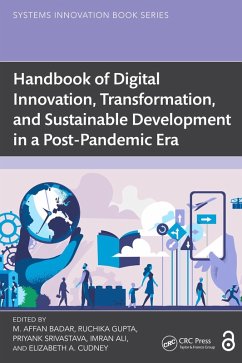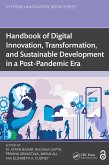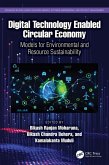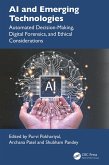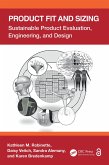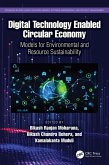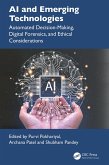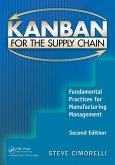Handbook of Digital Innovation, Transformation, and Sustainable Development in a Post-Pandemic Era (eBook, PDF)
Redaktion: Badar, M. Affan; Cudney, Elizabeth A.; Ali, Imran; Srivastava, Priyank; Gupta, Ruchika
173,95 €
173,95 €
inkl. MwSt.
Sofort per Download lieferbar

87 °P sammeln
173,95 €
Als Download kaufen

173,95 €
inkl. MwSt.
Sofort per Download lieferbar

87 °P sammeln
Jetzt verschenken
Alle Infos zum eBook verschenken
173,95 €
inkl. MwSt.
Sofort per Download lieferbar
Alle Infos zum eBook verschenken

87 °P sammeln
Handbook of Digital Innovation, Transformation, and Sustainable Development in a Post-Pandemic Era (eBook, PDF)
Redaktion: Badar, M. Affan; Cudney, Elizabeth A.; Ali, Imran; Srivastava, Priyank; Gupta, Ruchika
- Format: PDF
- Merkliste
- Auf die Merkliste
- Bewerten Bewerten
- Teilen
- Produkt teilen
- Produkterinnerung
- Produkterinnerung

Bitte loggen Sie sich zunächst in Ihr Kundenkonto ein oder registrieren Sie sich bei
bücher.de, um das eBook-Abo tolino select nutzen zu können.
Hier können Sie sich einloggen
Hier können Sie sich einloggen
Sie sind bereits eingeloggt. Klicken Sie auf 2. tolino select Abo, um fortzufahren.

Bitte loggen Sie sich zunächst in Ihr Kundenkonto ein oder registrieren Sie sich bei bücher.de, um das eBook-Abo tolino select nutzen zu können.
Businesses have faced many difficulties as a result of the global pandemic. Digital technologies have played a crucial role in addressing these issues and fostering resilience. It is, therefore, imperative to explore options for post-pandemic business transformation and rethinking sustainable development.
- Geräte: PC
- mit Kopierschutz
- eBook Hilfe
Andere Kunden interessierten sich auch für
![Handbook of Digital Innovation, Transformation, and Sustainable Development in a Post-Pandemic Era (eBook, ePUB) Handbook of Digital Innovation, Transformation, and Sustainable Development in a Post-Pandemic Era (eBook, ePUB)]() Handbook of Digital Innovation, Transformation, and Sustainable Development in a Post-Pandemic Era (eBook, ePUB)173,95 €
Handbook of Digital Innovation, Transformation, and Sustainable Development in a Post-Pandemic Era (eBook, ePUB)173,95 €![Digital Technology Enabled Circular Economy (eBook, PDF) Digital Technology Enabled Circular Economy (eBook, PDF)]() Digital Technology Enabled Circular Economy (eBook, PDF)52,95 €
Digital Technology Enabled Circular Economy (eBook, PDF)52,95 €![AI and Emerging Technologies (eBook, PDF) AI and Emerging Technologies (eBook, PDF)]() AI and Emerging Technologies (eBook, PDF)52,95 €
AI and Emerging Technologies (eBook, PDF)52,95 €![Product Fit and Sizing (eBook, PDF) Product Fit and Sizing (eBook, PDF)]() Kathleen M. RobinetteProduct Fit and Sizing (eBook, PDF)105,95 €
Kathleen M. RobinetteProduct Fit and Sizing (eBook, PDF)105,95 €![Digital Technology Enabled Circular Economy (eBook, ePUB) Digital Technology Enabled Circular Economy (eBook, ePUB)]() Digital Technology Enabled Circular Economy (eBook, ePUB)52,95 €
Digital Technology Enabled Circular Economy (eBook, ePUB)52,95 €![AI and Emerging Technologies (eBook, ePUB) AI and Emerging Technologies (eBook, ePUB)]() AI and Emerging Technologies (eBook, ePUB)52,95 €
AI and Emerging Technologies (eBook, ePUB)52,95 €![Kanban for the Supply Chain (eBook, PDF) Kanban for the Supply Chain (eBook, PDF)]() Stephen CimorelliKanban for the Supply Chain (eBook, PDF)64,95 €
Stephen CimorelliKanban for the Supply Chain (eBook, PDF)64,95 €-
-
-
Businesses have faced many difficulties as a result of the global pandemic. Digital technologies have played a crucial role in addressing these issues and fostering resilience. It is, therefore, imperative to explore options for post-pandemic business transformation and rethinking sustainable development.
Dieser Download kann aus rechtlichen Gründen nur mit Rechnungsadresse in A, B, BG, CY, CZ, D, DK, EW, E, FIN, F, GR, HR, H, IRL, I, LT, L, LR, M, NL, PL, P, R, S, SLO, SK ausgeliefert werden.
Produktdetails
- Produktdetails
- Verlag: Taylor & Francis eBooks
- Seitenzahl: 488
- Erscheinungstermin: 30. Dezember 2024
- Englisch
- ISBN-13: 9781040261347
- Artikelnr.: 72523972
- Verlag: Taylor & Francis eBooks
- Seitenzahl: 488
- Erscheinungstermin: 30. Dezember 2024
- Englisch
- ISBN-13: 9781040261347
- Artikelnr.: 72523972
- Herstellerkennzeichnung Die Herstellerinformationen sind derzeit nicht verfügbar.
M. Affan Badar, PhD, CPEM is a Professor, former Department Chair, and current Director of the consortium-based PhD in Technology Management program in the Bailey College of Engineering & Technology at Indiana State University (ISU), USA. While on leave from ISU from 2016 till 2018, he was Professor and Chair of the Industrial Engineering & Engineering Management Department at University of Sharjah (UAE). Prof. Badar earned his PhD degree in Industrial Engineering (IE) from University of Oklahoma (USA), MS in Mechanical Engineering (ME) from King Fahd University of Petroleum and Minerals (Saudi Arabia), and MSc in IE and BSc (Hons) in ME from Aligarh Muslim University (India). Prof. Badar has published one edited book, five book chapters and over 90 articles in refereed journals and proceedings in the areas of lean six sigma, design, reliability, quality, engineering economy, healthcare, and supply chain. He received the ISU Theodore Dreiser Distinguished Research/Creativity Award in 2023, IEOM Fellow Award in 2022, and Albert Nelson Marquis Lifetime Achievement Award in 2017. Prof. Badar has been serving as an Associate Editor for Engineering Management Journal; editorial board member for Int. J. of Quality & Reliability Management and NED University J. of Research: Applied Sciences; and reviewer for various journals and conferences. He was Editor-in-Chief for Int. J. of Forensic Engr & Mgt and Editor for Advances in Mechanical Engineering. Ruchika Gupta, Ph.D. is a Professor and Director at Mangalmay Institute of Management & Technology, Greater Noida, INDIA. She has an academic experience of over 20 years during which she has played multifaceted roles from being a teacher, trainer, mentor, and administrator. She is a certified trainer and judge for "Social Innovation Generation" by HEC, Montreal, Canada, and holds a Ph.D. with 3 Master's Degrees. Her research areas are diverse and focus on interdisciplinary research. Dr. Gupta has published 1 edited book, 1 authored book, 6 case studies, and over 80 articles in refereed journals and proceedings. She has been granted 35 copyrights and 5 patents and is also serving as editor, reviewer, and advisory board member of several journals of repute. Her remarkable achievements have garnered numerous accolades, including the "Women Empowerment Award" and "Rashtra Shakti Shiromani Samman." Priyank Srivastava, Ph.D. is an Associate Professor in the Department of Operations at the School of Business, Galgotias University, Greater Noida, Uttar Pradesh, India. He has vast academic and research experience of eighteen years. He completed graduation in 2001, post-graduation in 2006, PhD in 2018, from Amravati University and Madan Mohan Malviya Engineering College, Gorakhpur and National Institute of Technology, Kurukshetra respectively. He has published numerous articles in International Journals & conferences, book chapters, and edited books. He is a reviewer of many journals of international repute. He is a certified risk management assessor from BSI. His research interests are Operations Management, Maintenance Management, Risk & Reliability Analysis, Supply Chain Management, Business Analytics and MCDM techniques. He is a life member of ISTE. Imran Ali, Ph.D., MBA is a Senior Lecturer in the Operations and Innovation Management department at the School of Business and Law, Central Queensland University, Australia. Dr. Ali holds a Ph.D. in Business Management (Logistics and Supply Chain Management) from the University of South Australia and serves as a senior editor for the International Journal of Emerging Markets and sits on the review board of various journals. He has 17 years' experience of working with academic and industrial institutions within Australia and overseas. His research focuses on operations and supply chain management covering several emerging topics such as digital transformation, risk management and resilience, sustainability, and climate change, and appears in several high-quality journals. His research has received several accolades, such as Best Proceeding Paper at the Academy of Management 2019 Conference (USA), Best Track Paper Award at the Industrial Engineering and Operations Management (IEOM) Conference 2022, Sydney, Australia, Vice-Chancellor's Research Commendation Award for Outstanding Early-Career Researcher 2021, Vice-Chancellor's Award for Outstanding Early-Career Researcher 2022, Dean's Award for Outstanding Early-Career Researcher, 2021 & 2022 (two years in a row) at CQUniversity. Owing to a diversified experience and a passion for innovative and industry-engaged education, Dr. Ali enjoys teaching at the interface of theoretical knowledge and real-world industry practices including a range of subjects. Elizabeth Cudney, PhD, CLSSMBB is President of Cudney Consulting Group, LLC, and a Professor of Data Analytics in the John E. Simon School of Business at Maryville University. She received her B.S. in Industrial Engineering from North Carolina State University, Master of Engineering in Mechanical Engineering and MBA from the University of Hartford, and doctorate in Engineering Management from the University of Missouri-Rolla. She received the 2023 Walter E. Masing Book Prize from the International Academy for Quality for her book on Lean Sustainability. Dr. Cudney received the 2022 Crosby Medal from ASQ and the 2021 Bernard R. Sarchet Award from ASEE EMD for "lifetime achievement in engineering management education. She received the 2021 Walter E. Masing Book Prize from the International Academy for Quality for her book on Lean Six Sigma. In 2018, Dr. Cudney received the ASQ Crosby Medal for her book on Design for Six Sigma. Dr. Cudney received the 2018 IISE Fellow Award. She also received the 2017 Yoshio Kondo Academic Research Prize from the International Academy for Quality for sustained performance in exceptional published works. In 2014, Dr. Cudney was elected as an ASEM Fellow. In 2013, Dr. Cudney was elected as an ASQ Fellow. In 2010, Dr. Cudney was inducted into the International Academy for Quality. She received the 2008 ASQ A.V. Feigenbaum Medal and the 2006 SME Outstanding Young Manufacturing Engineering Award. She has published 14 books and over 130 peer-reviewed journal papers. Dr. Cudney is a certified Lean Six Sigma Master Black Belt. She holds eight ASQ certifications, which include ASQ Certified Quality Engineer, Manager of Quality/Operational Excellence, and Certified Six Sigma Black Belt, amongst others.
Section 1. Digital Innovation and Transformation for Sustainability. 1. A
Framework for Building Resilience through Innovation and Process
Optimization in AI-Powered Digital Transformation. 2. Driving Business
Sustainability through Digital Supply Chains. 3. Digital Transformation
Framework for Logistics Service Providers: Systematic Literature Review. 4.
Achieving Business Sustainability with Blockchain Technology. 5. Blockchain
Revolution: Transforming Business Sustainability in the Era of Industry 4.0
and Financial Innovation. 6. Supply Chain Risk Management, Optimization,
and Performance Analytics through Blockchain Integration: Bibliometric
Analysis. Section 2. Environmental Sustainability and Digitalization. 7.
Environmental Sustainability: Digitalization and Big Data. 8. Green
Logistics: A New Frontier for Economic Growth and Social Development in
Türkiye and Poland. 9. Energy Efficient Design Strategies for Buildings:
Lessons from High Performance Buildings. Section 3. Sustainability
Strategies and Management. 10. From Industry 4.0 to Industry 5.0:
Transitioning to Circular Business Paradigms - A Review. 11. Industry 4.0
and Sustainability of Human Resources. 12. Model of Dual Management (DM) in
Company Scale. 13. A Stochastic Programming Model for Managing Supply Chain
Disruptions in the Post-Covid-19 Era. Section 4. Digital Innovation,
Transformation, and Sustainability: Industry Cases. 14. Profitability of
Shipping and the Role of Fleet Ownership - North European Company Case
Study. 15. A Case Study: Lean Transformation at Sultan Qaboos University
Hospital in Oman. 16. Tata Motors: Driving into the Future with
Sustainability and Innovation. 17. Blockchain in Healthcare: A Critical
Evaluation. 18. Digital Transformation in Advertising after COVID-19:
Routing the New Landscape. 19. Identifying predictors and comparing Machine
Learning algorithms to detect erroneous Medicaid adjudication in the USA.
Framework for Building Resilience through Innovation and Process
Optimization in AI-Powered Digital Transformation. 2. Driving Business
Sustainability through Digital Supply Chains. 3. Digital Transformation
Framework for Logistics Service Providers: Systematic Literature Review. 4.
Achieving Business Sustainability with Blockchain Technology. 5. Blockchain
Revolution: Transforming Business Sustainability in the Era of Industry 4.0
and Financial Innovation. 6. Supply Chain Risk Management, Optimization,
and Performance Analytics through Blockchain Integration: Bibliometric
Analysis. Section 2. Environmental Sustainability and Digitalization. 7.
Environmental Sustainability: Digitalization and Big Data. 8. Green
Logistics: A New Frontier for Economic Growth and Social Development in
Türkiye and Poland. 9. Energy Efficient Design Strategies for Buildings:
Lessons from High Performance Buildings. Section 3. Sustainability
Strategies and Management. 10. From Industry 4.0 to Industry 5.0:
Transitioning to Circular Business Paradigms - A Review. 11. Industry 4.0
and Sustainability of Human Resources. 12. Model of Dual Management (DM) in
Company Scale. 13. A Stochastic Programming Model for Managing Supply Chain
Disruptions in the Post-Covid-19 Era. Section 4. Digital Innovation,
Transformation, and Sustainability: Industry Cases. 14. Profitability of
Shipping and the Role of Fleet Ownership - North European Company Case
Study. 15. A Case Study: Lean Transformation at Sultan Qaboos University
Hospital in Oman. 16. Tata Motors: Driving into the Future with
Sustainability and Innovation. 17. Blockchain in Healthcare: A Critical
Evaluation. 18. Digital Transformation in Advertising after COVID-19:
Routing the New Landscape. 19. Identifying predictors and comparing Machine
Learning algorithms to detect erroneous Medicaid adjudication in the USA.
Section 1. Digital Innovation and Transformation for Sustainability. 1. A
Framework for Building Resilience through Innovation and Process
Optimization in AI-Powered Digital Transformation. 2. Driving Business
Sustainability through Digital Supply Chains. 3. Digital Transformation
Framework for Logistics Service Providers: Systematic Literature Review. 4.
Achieving Business Sustainability with Blockchain Technology. 5. Blockchain
Revolution: Transforming Business Sustainability in the Era of Industry 4.0
and Financial Innovation. 6. Supply Chain Risk Management, Optimization,
and Performance Analytics through Blockchain Integration: Bibliometric
Analysis. Section 2. Environmental Sustainability and Digitalization. 7.
Environmental Sustainability: Digitalization and Big Data. 8. Green
Logistics: A New Frontier for Economic Growth and Social Development in
Türkiye and Poland. 9. Energy Efficient Design Strategies for Buildings:
Lessons from High Performance Buildings. Section 3. Sustainability
Strategies and Management. 10. From Industry 4.0 to Industry 5.0:
Transitioning to Circular Business Paradigms - A Review. 11. Industry 4.0
and Sustainability of Human Resources. 12. Model of Dual Management (DM) in
Company Scale. 13. A Stochastic Programming Model for Managing Supply Chain
Disruptions in the Post-Covid-19 Era. Section 4. Digital Innovation,
Transformation, and Sustainability: Industry Cases. 14. Profitability of
Shipping and the Role of Fleet Ownership - North European Company Case
Study. 15. A Case Study: Lean Transformation at Sultan Qaboos University
Hospital in Oman. 16. Tata Motors: Driving into the Future with
Sustainability and Innovation. 17. Blockchain in Healthcare: A Critical
Evaluation. 18. Digital Transformation in Advertising after COVID-19:
Routing the New Landscape. 19. Identifying predictors and comparing Machine
Learning algorithms to detect erroneous Medicaid adjudication in the USA.
Framework for Building Resilience through Innovation and Process
Optimization in AI-Powered Digital Transformation. 2. Driving Business
Sustainability through Digital Supply Chains. 3. Digital Transformation
Framework for Logistics Service Providers: Systematic Literature Review. 4.
Achieving Business Sustainability with Blockchain Technology. 5. Blockchain
Revolution: Transforming Business Sustainability in the Era of Industry 4.0
and Financial Innovation. 6. Supply Chain Risk Management, Optimization,
and Performance Analytics through Blockchain Integration: Bibliometric
Analysis. Section 2. Environmental Sustainability and Digitalization. 7.
Environmental Sustainability: Digitalization and Big Data. 8. Green
Logistics: A New Frontier for Economic Growth and Social Development in
Türkiye and Poland. 9. Energy Efficient Design Strategies for Buildings:
Lessons from High Performance Buildings. Section 3. Sustainability
Strategies and Management. 10. From Industry 4.0 to Industry 5.0:
Transitioning to Circular Business Paradigms - A Review. 11. Industry 4.0
and Sustainability of Human Resources. 12. Model of Dual Management (DM) in
Company Scale. 13. A Stochastic Programming Model for Managing Supply Chain
Disruptions in the Post-Covid-19 Era. Section 4. Digital Innovation,
Transformation, and Sustainability: Industry Cases. 14. Profitability of
Shipping and the Role of Fleet Ownership - North European Company Case
Study. 15. A Case Study: Lean Transformation at Sultan Qaboos University
Hospital in Oman. 16. Tata Motors: Driving into the Future with
Sustainability and Innovation. 17. Blockchain in Healthcare: A Critical
Evaluation. 18. Digital Transformation in Advertising after COVID-19:
Routing the New Landscape. 19. Identifying predictors and comparing Machine
Learning algorithms to detect erroneous Medicaid adjudication in the USA.
